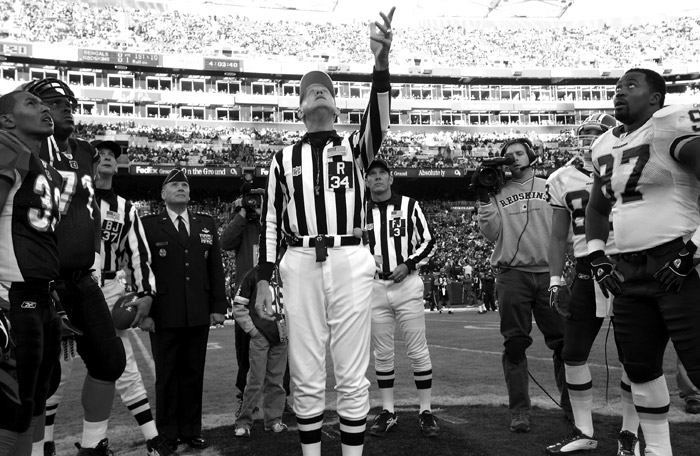Two minutes to save the world
One of the most exciting sequences in any football game is the fabled “two-minute drill.” Offences open up when they are up against the clock; more risks are taken, the pace is faster, and the crowd is on its feet. Whichever team starts on offence will receive the ball on the 20 yard line and will have, you guessed it, two minutes to score. After the initial team scores, squanders possession, or exhausts their alloted time, the opposing team gets a chance at redemption. This would then continue for two minutes at a time until one team emerges victorious.
Additionally, each team will be required to attempt a two-point conversion after each touchdown scored. This is because the rate at which placekickers convert the standard one-point conversion is preposterously high and adds little surprise to the game.
This proposed solution has the potential to add a new dimension to professional football that would be different than the college game. Rather than borrowing completely from the NCAA, this finds a somewhat happy—or entirely absurd—medium that promises to keep fans on the edge of their seats.
– Mayaz Alam
Luck schmuck
I see no reason to change the current overtime rules in the regular season. They allow for the game to end quickly, which reduces the chance for a game to drag on and lose some of its excitement. It also adds an element of pressure and luck that can spice up even the most boring regular season games. Also, with the principle of regression towards the mean at work over the course of a sixteen-game regular season, the current rules aren’t going to have significant playoff implications for any team involved in an overtime match.
In the playoffs, the teams should have extra time, as they do in soccer, and play until one team comes out with more points at the end of the game. The post-season is a knockout tournament, and the fans want to see the best team of the day win–not the team that wins the coin toss. The importance of minimizing the effect of luck is magnified in the playoff setting, as there are no second chances.
– Zikomo Smith
Play on
The current NFL overtime rules are worse than those in any other professional sport. Before the 2010 rule change, the sudden death format put an inordinate amount of importance on the coin toss. It kept superstar players like Peyton Manning on the sidelines, with as much ability to affect a game’s outcome as someone sitting at home yelling at the television would have. Unfortunately, the current format isn’t much better. Requiring both teams to possess the ball is a great change, but the touchdown exception makes the rule little more than a half-measure, and thus practically ineffective. The current system can be compared to playing extra innings in baseball, but not allowing the home team to bat if the visitors hit a grand slam in the top of the 10th inning.
The most entertaining alternative for fans would be to play a full fifth quarter and accept a tie in the regular season if the score is still level at the end, as is done in soccer. Sudden death can work in a sport like hockey, where the possession is free-flowing and both teams have the opportunity to make plays, but the format of football is fundamentally different and the overtime rules should reflect that.
– Nick Jasinski
I love college
When the NFL switched its overtime rules, its aim was to eliminate the issue of coin tosses determining winners. This clearly has not been the case, and it is because of the provision that a touchdown can win a game on the first possession, leaving one team’s offence on the sidelines. To remove the importance of the coin toss entirely, the NFL needs to adopt a similar system to that of college football. In this version of overtime, each team gets one possession and the game plays out like a shootout of sorts. The first team on offence starts with the ball on the 25-yard line, and their possession ends when they score, turn the ball over, or miss a field goal. The second team then has to match or do better. If they score the same number of points, a second round of possessions ensues–and so on and so forth–and if one team has scored more, that team is crowned the winner.
This removes the importance of the coin toss, as it is now only used to determine who gets to go on offence first. Another improvement would be to have possessions begin on the 40-yard line rather than on the 25. This would make scoring easier, and hopefully add a little bit of extra excitement to overtime.
– Wyatt Fine-Gagné








